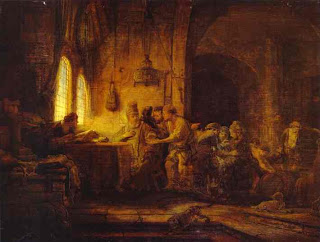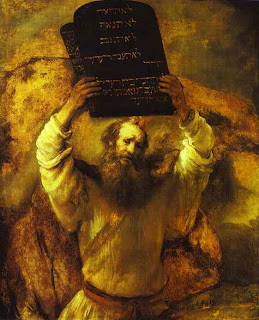
Part 6 (vi)- The Pharisee and the Tax Collector
Here Bailey wants to 'rescue this "not so simple story" from the "centuries old barnacles" which have attached themselves to it'. Try downloading the commentaries from
E-Sword. See if you can find them thar barnacles there. And while you are at it send them $15. It is well worth it.
Bailey starts by claiming that we should take the first verse (Luke 18:9) "seriously". Again, makes me wonder why he didn't take the last verse seriously (or address it at all) in the previous post. Seems to think this is an "apostolic [Luke?] signpost". Musta overlooked that previous signpost.
Again, this parable is addressed to the Pharisees. Again, Jesus is mocking them. Again, Jesus is telling them that they are unrighteous. Again Jesus is telling them to repent.
Bailey thinks them thar barnacles are the
derived instructions on how to be humble in prayer(346). I find them barnacles pretty hard to see, Matey. He would like us to see- that this here parable tells us how we are
made righteous with God. How we are
made mates with God. Problem is, he doesn't show us
how. Just tells us that we are. Tells us to hang in there. Let's see how he
derives this understanding.
First, Bailey again has to favour(347) the liberal translation of the NRSV over most other translations- on
where the Pharisee is actually standing. Bailey
may be right here- but it doesn't tell us much.
Later, Bailey has to dismiss most English translations (349)- to tell us the
true standing of the tax collector. Again, Bailey is standing on shaky ground. Or is it his sea legs?
Let's deal with the latter dismissal. Here Bailey demands that we disallow the Greek word
hilaskomai a semantic range. Is this fair? Is this fair in its context?
Seems there is no reason "apparent" to Bailey why we should
deny the translation, "O Lord, make an
atonement for me" as a result. Seems apparent to me that a humble man (v. 14) would not make such a bold demand. That a humble man would plead for
mercy! The other end of the semantic range.
Much more in keeping with Exodus 33:19. Much more in keeping with the last words of the Puritan
Thomas Hooker- who was told on his deathbed to look forward to his eternal rewards. Hooker kinda replied, "I go not to seek my eternal rewards, Matey. I go to seek
mercy!"
But all the above stuff is just flotsam and jetsam compared to Bailey's definition of
dikaios (344).
Bailey floats around in Greece and the Hellenistic world without an anchor to tie this definition to. Providing a bare allusion to
Kittel [more in next post]. Finally jetting to a different word.
As Bailey cites of Von Rad, "There is absolutely no concept in the Old Testament with so central a significance for all the relationships of human life as that of
sadaqa (righteousness)". I would protest, "Except for how we are
made righteous, Mateys!" That is our true plight. Bailey gives us no solution because he doesn't see a plight.
Bailey seems to think that an
all-encompassing righteousness was given to Israel from the earliest times onward (345). Where is Christ in this gift? Did He not
make us righteous? And how did he
make us righteous? Can we overlook the cross?
And how much of Israel is overlooking Christ and the cross today? All but 15,000 Christians in Israel according to current estimates. All but 15,000 overlook the cross in their own backyard. Indeed, in their own bailiwick.
Bailey does little to illuminate that cross. To show Israel that she is
not righteous.
Instead he encourages Israel to "maintain" her righteousness. To remain loyal to her unearned status. And as a reflective response to her unearned status-
continue in righteousness.
Again, welcome to the
New Perspective. Welcome to the new
bailiwick. Welcome to the
Brink.
Bailey claims that behind this parable is the rich heritage of God's gracious gifts of saving
acts (righteousness). Why is it that I can only think of one
truly saving act?
Allow me to close with a D.A. Carson analogy:
A little old Jewish lady dying of cancer calls up the rabbi of her balliwick for counsel. Pastor Bailey arrives and is asked in final breaths, "Pastor, what must I do to be saved?"
Pastor Bailey, relying on his NRSV parable, Von Rad and cultural studies replies," Just continue to be mindful that you have been granted a special relationship in the presence of God. That in response- you should continue in a righteous standard toward God, men, animals and His natural environment."
If Pastor Bailey can't do better than this... he should be
walking the plank!

 Part 6 (x)- The Parable of the Noble
Part 6 (x)- The Parable of the Noble





















